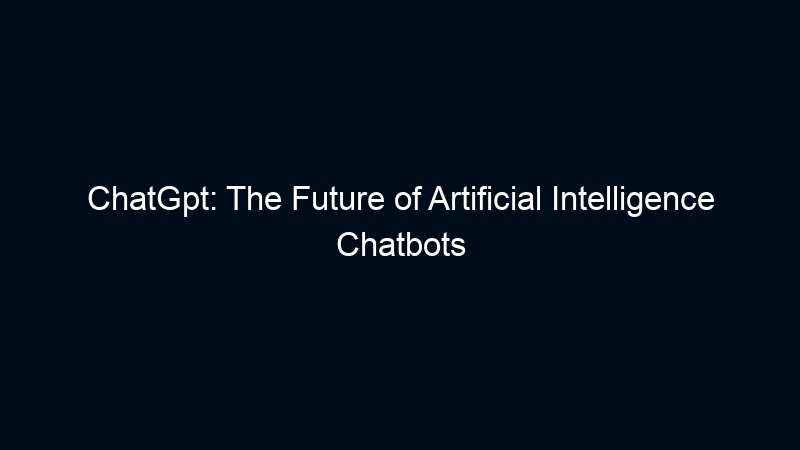Artificial intelligence has revolutionized the way we interact with technology. From virtual assistants like Siri and Alexa to self-driving cars and personalized advertising, AI is changing the way we live and work. One of the most exciting applications of AI is chatbots, and ChatGpt is at the forefront of this technology. In this article, we’ll explore the future of ChatGpt, its advantages, and its disadvantages.
What is ChatGpt?
ChatGpt is an advanced chatbot developed by OpenAI, based on the GPT-3.5 architecture. It’s a language model that uses deep learning algorithms to understand and generate human-like responses to natural language input. ChatGpt can engage in human-like conversations and provide answers to a wide range of questions.
The Future of ChatGpt
The future of ChatGpt is bright, with many exciting possibilities. As the technology advances, we can expect to see ChatGpt being used in a wide range of industries, from customer service to healthcare, education, and even entertainment. Some potential future applications of ChatGpt include:
Personalized shopping experiences: ChatGpt could be used to provide personalized shopping recommendations based on a customer’s preferences and purchase history.
Mental health support: ChatGpt could be used as a virtual therapist, providing support and guidance to people struggling with mental health issues.
Education: ChatGpt could be used as a virtual tutor, answering students’ questions and providing personalized feedback.
Content creation: ChatGpt could be used to generate articles, reports, and even creative writing.
Improved Customer Service: ChatGpt enables businesses to provide 24/7 customer support, without the need for human intervention. It can answer customer queries, resolve issues, and even place orders, providing a seamless experience for customers.
Cost-Effective: ChatGpt is a cost-effective alternative to hiring human customer service representatives. It can handle multiple conversations simultaneously, reducing the need for a large team of support staff.
Increased Efficiency: ChatGpt can handle routine tasks and queries, freeing up human agents to focus on more complex issues. This improves efficiency and productivity in the workplace.
Personalization: ChatGpt can use data to personalize conversations and provide tailored recommendations to customers. This improves the overall customer experience and increases customer loyalty.
Advantages of ChatGpt
There are several advantages of ChatGpt, including:
24/7 availability: ChatGpt can be available 24/7, providing instant responses to customer queries and support requests.
Cost-effective: ChatGpt can be cost-effective compared to hiring and training human customer support staff.
Scalability: ChatGpt can be easily scaled to handle a high volume of queries and support requests.
Personalization: ChatGpt can provide personalized responses based on the user’s input and preferences.
Efficiency: ChatGpt can provide quick and efficient responses to simple queries, freeing up human support staff to handle more complex issues.
Accurate and efficient: ChatGpt is highly accurate in its responses and can provide quick and efficient customer service.
Disadvantages of ChatGpt
While ChatGpt has many advantages, there are also some potential disadvantages, including:
Lack of empathy: ChatGpt may lack the empathy and emotional intelligence of human support staff, which can be important in some customer interactions.
Limited scope: ChatGpt may struggle with complex or nuanced queries outside of its programming and training data.
Overreliance: There is a risk of over-reliance on ChatGpt, leading to a reduction in the quality of human customer support.
Limited Emotional Intelligence: ChatGpt can simulate human-like conversations, but it lacks the emotional intelligence that comes with human interaction. This can lead to misunderstandings or misinterpretations of customer intent.
Limited Domain Expertise: ChatGpt has a vast knowledge base, but it’s not an expert in every domain. It may struggle to answer complex or specialized queries, leading to frustration for customers.
Security and Privacy Concerns: ChatGpt collects and stores data from conversations, which raises concerns about data privacy and security. Businesses must ensure that they’re complying with data protection regulations and taking steps to secure customer information.
Ethical Concerns: ChatGpt can be used for malicious purposes, such as spreading misinformation or engaging in unethical practices. Businesses must use it responsibly and ensure that it’s not being used to deceive or harm customers.
ChatGpt is a cutting-edge technology with many exciting applications. As the technology advances, we can expect to see ChatGpt being used in a wide range of industries, providing personalized, efficient, and cost-effective support to customers and users. While there are some potential disadvantages to ChatGpt, these can be managed with careful implementation and monitoring. Overall, ChatGpt is a promising technology that is set to change the way we interact with technology and each other.
Parivesh Singh Gupta is the founder of TweeLabs, with over 12+ years of experience in digital marketing, SEO content writing, web development, and eCommerce solutions. He specializes in WordPress development, Meta & Google Ads, Shopify & WooCommerce, Canva-based design, and AI automation.
Parivesh helps startups and growing businesses achieve online success through high-converting strategies, powerful ad campaigns, and SEO-rich content that ranks.
For collaborations or consulting:
Email: parivesh@tweelabs.com
Website: www.tweelabs.com
Follow on LinkedIn: Parivesh Singh Gupta

